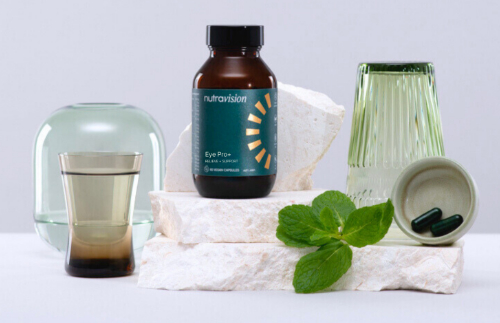Have you noticed that things don’t seem as clear as they used to? Perhaps the menu at your favorite restaurant appears a bit out of focus, or those road signs are harder to read on your way to work.

Blurry vision is a common issue that often comes with age and prolonged exposure to digital screens. However, you can take proactive steps to reduce its impact beyond just updating your glasses prescription.
In this article, we delve into some of the best vitamins and supplements that can help with blurry vision and support overall eye health.
What Are The Best Eye Vitamins & Supplements for Blurry Vision?
You might already know that many eye health supplements contain vitamins A, C, and E, along with omega-3 fatty acids. While these nutrients are indeed vital for maintaining good vision, they are often easily obtained through a balanced diet.
Instead, let’s focus on some of the best eye vitamins and nutrients for blurry vision that aren’t as readily available from food alone. Here, we uncover five exceptional vision vitamins and delve into why they are so special.
Bilberry
Bilberry is often considered the European cousins of blueberries, are more than just a tasty ingredient for jams and pies. Traditionally, they’ve been used to address eye problems, improve circulation, and manage blood sugar levels in diabetes.

What sets bilberry apart is its high concentration of anthocyanins, the plant pigments with potent antioxidant properties. These antioxidants are believed to be the key bioactive compounds responsible for the numerous health benefits of bilberry.
Bilberry, with its superior anthocyanin content compared to other berries, helps in lowering blood glucose levels, reducing inflammation, boosting antioxidant defenses, and lowering oxidative stress.
Here are five key reasons why bilberry is widely considered one of the best sources of nutrients for blurry vision:
1. Reduces Oxidative Stress: The powerful antioxidants in bilberry help reduce oxidative stress on the focusing muscles in your eyes, soothing digital eye strain and significantly enhancing focusing abilities.
2. Improves Tear Production: These antioxidants boost tear production, improving ocular lubrication and lessening the effects of dry eyes on comfort and vision.
3. Enhances Night Vision: Regeneration of rhodopsin is helped by anthocyanins, a crucial protein in our rod photoreceptor cells. This enhances the retina’s ability to capture light and movement, particularly in low light and at night.
4. Supports Glaucoma Management: Bilberry enhances blood flow and increases the supply of oxygen and nutrients to the eye and optic nerve for those with glaucoma, showing documented improvements in visual fields.
5. Aids Diabetic Retinopathy: Bilberry supports vision for those with diabetes by helping with blood glucose control, reinforcing fragile blood vessels in the eye, and improving signs of retinopathy.
Oral consumption of standardised bilberry extract for 12 weeks relieves the tonic accommodation of the ciliary muscle caused by video display tasks and near-vision tasks.
Dr Marie Kosehira, Nutrients, 2020
Lutein & Zeaxanthin

The naturally occurring pigments responsible for the vibrant colors in fruits and vegetables are the carotenoids, lutein and zeaxanthin.
These are the best nutrients for your eyes due to their remarkable properties:
1. UV and Blue Light Absorption: They absorb harmful ultraviolet and blue light, acting as a natural shield for your eyes and limiting radiation-induced damage to the retina.
2. Targeted Antioxidant Effect: Lutein and zeaxanthin deliver a potent antioxidant effect at the lens and macula, protecting these areas from free radical oxidative damage.
3. Enhanced Visual Performance: Concentrated in the lens and macula, lutein and zeaxanthin work synergistically to maintain visual acuity, enhance contrast sensitivity, aid photostress recovery, and improve visual processing speed.
According to research, consuming more of these carotenoids can minimize glare disability and visual discomfort, as well as lower the risk of age-related macular degeneration. They also improve skin hydration and suppleness, resulting in brighter skin, fewer wrinkles, and clearer vision.
Macular carotenoid supplementation yielded significant improvement in macular pigment optical density, eye strain, eye fatigue, and all visual performance measures.
Dr James Stringham, Foods, 2017
Saffron
Saffron, sometimes known as ‘Red Gold,’ is a highly valued spice, owing to the labor-intensive methods necessary to harvest it. Its therapeutic powers are legendary, and it has been used to cure a wide range of conditions, including menstrual cramps, digestive problems, migraines, and even depression.

Saffron’s therapeutic effects stem from a powerful combination of carotenoids, including crocin and crocetin, bioactive antioxidants known as lepticrosalides, and anti-inflammatory qualities. These chemicals provide important support for eyesight, particularly as we age.
Here’s how saffron distinguishes itself as an excellent eye health vitamin for blurred vision:
1. Glaucoma Management: Saffron helps reduce eye pressure, which is essential for preventing vision loss in glaucoma patients.
3. Diabetic Retinopathy: Saffron strengthens blood vessels in the retina, which reduces fluid leaks and improves vision.
Saffron supplementation induces macular function improvements from baseline that are extended over a long-term followup.
Dr Marco Piccardi, Evidence-Based Complementary & Alternative Medicine, 2012
The Bioavailable Form of Vitamin B12: Methylcobalamin
Vitamin B12, particularly in its methylcobalamin form, is an essential nutrient for vision and overall health. Methylcobalamin is the biologically active form of vitamin B12, which means it’s immediately usable by the body.
It supports vision in several key ways:
1. Nerve Function: The healthy nerve function at the cornea is supported by methylcobalamin, which may lessen dry eye symptoms and therefore, blurry vision.
2. Visual Accommodation: By strengthening the neurons that enable eye muscles to shift focus between far-off and up-close objects, methylcobalamin enhances visual accommodation.
3. Lower Homocysteine Levels: High homocysteine levels are associated with a higher risk of glaucoma and macular degeneration. Methylcobalamin aids in bringing these levels down.

4. Protection of the Optic Nerve: This bioavailable form of vitamin B12 promotes nerve regeneration and shields the optic nerve from glaucoma-related damage, preserving healthy vision fields.
Participants who reported supplementary vitamin B12 intake had 47% reduced risk of any incident age-related macular degeneration.
Dr Bamini Gopinath, American Journal of Clinical Nutrition, 2013
Integrating Aspects for a Brighter Perspective
The best way to get the nutrients your body needs for good eyesight is to follow a balanced, healthful dietary regimen like the Mediterranean diet. Other essential nutrients include zinc, magnesium, omega-3 fatty acids, and vitamins A, C, and E.
But as we age and spend more time in front of screens than ever before, eating healthfully may not be sufficient. To prevent blurry vision, we need to take extra eye-specific vitamin supplements in addition to a healthy diet. Our eyes need extra support to keep sharp.
You can include methylcobalamin, saffron, lutein and zeaxanthin, or bilberry in your regular supplement regimen. But why limit yourself to just one? Personally, I recommend a comprehensive supplement like Nutravision. The convenience of a capsule once or twice daily that treats dry eyes, age-related changes, and digital screen overexposure makes sense.

By choosing Nutravision, you are not just picking an Australian, quality-assured eye health supplement; you are also prioritising your vision and entrusting it to a product recommended by industry professionals.


